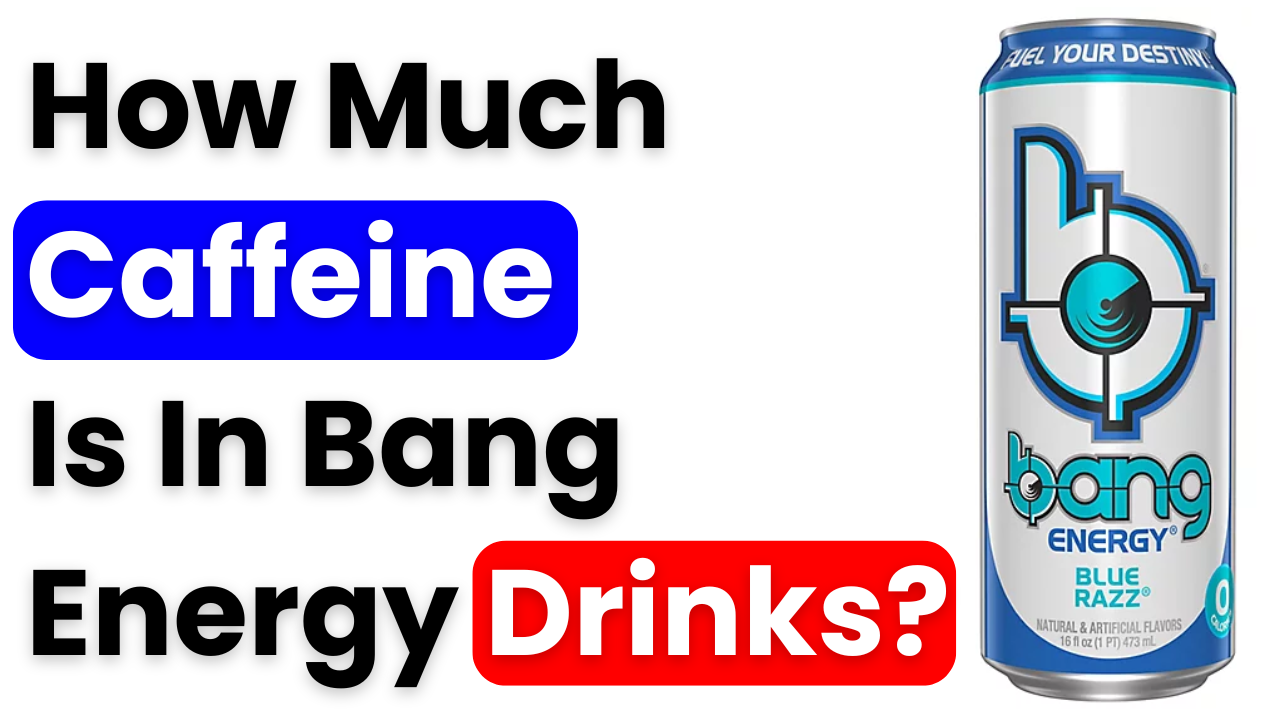Bang Energy Drinks have surged in popularity in 2024, becoming a favorite choice for those seeking an energy boost. With their vibrant packaging and a wide array of flavors, Bang has carved out a significant presence in the crowded energy drink market. However, understanding the caffeine content in these drinks is crucial for consumers who want to stay energized without compromising their health. This article breaks down the caffeine content in Bang Energy Drinks, compares it with other beverages, explores additional ingredients, examines health implications, and provides safe consumption guidelines.
Caffeine Content in Bang Energy Drinks
Each can of Bang Energy Drink contains a hefty 300 milligrams of caffeine. To put this into perspective, a standard 16-ounce can of Bang packs about three times the caffeine found in a typical cup of coffee, which has around 95 milligrams. When compared to other popular energy drinks like Red Bull, which contains approximately 111 milligrams per 16 ounces, Bang stands out with its higher caffeine content.
For those who prefer tea, an 8-ounce cup of black tea usually has about 47 milligrams of caffeine, making Bang Energy Drinks significantly stronger. This high caffeine level is designed to provide a powerful energy boost, enhancing alertness and focus. However, it’s essential to consider how this amount compares to recommended daily limits to avoid potential health risks.
Additional Ingredients and Their Benefits
Beyond caffeine, Bang Energy Drinks include other ingredients like Super Creatine and Coenzyme Q10, which offer additional benefits.
Super Creatine
Super Creatine is a liquid-stable form of creatine, an ingredient well-known in the fitness community. Creatine helps muscles retain water, enhancing their ability to perform work. It’s popular among athletes for building strength and endurance. Unlike regular creatine supplements, Super Creatine in Bang is easier for the body to absorb, providing a quick energy boost during workouts.
Coenzyme Q10 (CoQ10)
CoQ10 is a natural antioxidant found in the body that plays a crucial role in cellular energy production. As we age, CoQ10 levels decrease, making supplementation beneficial for maintaining energy levels and overall health. In Bang Energy Drinks, CoQ10 helps support cellular function and energy metabolism, contributing to sustained energy without the crash often associated with high-caffeine beverages.
Potential Advantages and Drawbacks
While these additional ingredients can offer benefits like improved muscle performance and enhanced cellular energy, there are potential drawbacks. High levels of creatine may cause digestive issues in some individuals, and excessive CoQ10 intake could lead to unwanted side effects such as stomach upset or headaches. It’s important to consume Bang Energy Drinks in moderation to balance these benefits and risks.
Health Implications of High Caffeine Intake
Consuming high levels of caffeine, like the 300 milligrams found in Bang Energy Drinks, can have significant health implications, especially if not managed properly.
Recommended Daily Limits
The Mayo Clinic recommends that adults limit their caffeine intake to no more than 400 milligrams per day. For teenagers, the American Academy of Pediatrics advises a maximum of 100 milligrams daily. Exceeding these limits can lead to adverse health effects.
Short-Term Health Risks
In the short term, high caffeine consumption can cause anxiety, restlessness, insomnia, and increased heart rate. Some individuals may experience jitteriness, shaking hands, or difficulty concentrating. These symptoms can interfere with daily activities and overall well-being.
Long-Term Health Risks
Long-term excessive caffeine intake may lead to more severe health issues, such as heart problems, high blood pressure, and potential dependency or addiction. Chronic overconsumption can also disrupt sleep patterns, leading to persistent fatigue and decreased cognitive function over time.
Bang’s Marketing Strategies and Social Media Presence
Bang Energy has effectively utilized modern marketing strategies to build its brand, particularly targeting young consumers through social media.
Influencer Partnerships and Branding
Bang collaborates with fitness models, lifestyle bloggers, and influencers who resonate with their target audience. These brand ambassadors promote Bang Energy Drinks across various platforms, showcasing the product’s benefits and appealing flavors. This strategy not only enhances brand visibility but also builds trust and relatability among potential consumers.
Impact on Consumer Behavior
By leveraging social media, Bang has created a strong online presence with over 1 million Instagram followers. Their vibrant and engaging content attracts teens and young adults, encouraging them to join the “Bang Revolution.” This targeted marketing approach significantly influences consumer behavior, making Bang Energy Drinks a trendy choice among students and young professionals seeking both energy and a sense of community.
Personal Stories and Testimonials
Hearing from real consumers can provide valuable insights into the effects of Bang Energy Drinks.
Positive Experiences
Many users appreciate the robust energy boost that Bang provides, helping them stay alert during long study sessions or intense workouts. For example, Daniel Reiter, a theatre sophomore, shares, “I love the taste, and it gets me through the long school days.”
Cautionary Tales
However, not all experiences are positive. Some users report adverse effects from high caffeine intake. Lucy Oxer, a theatre junior, recounts drinking three cans for a pep rally and experiencing severe jitters and a racing heart. These stories highlight the importance of moderation and awareness of personal caffeine tolerance.
Safe Consumption Guidelines
To enjoy Bang Energy Drinks safely, it’s essential to follow expert recommendations on caffeine intake.
Expert Recommendations
- Adults: Limit caffeine consumption to 400 milligrams per day.
- Teens: Keep caffeine intake below 100 milligrams daily.
- Individual Tolerance: Start with one can to assess how your body reacts before considering additional consumption.
Tips for Monitoring and Managing Caffeine Consumption
- Track Intake: Keep a daily log of all caffeinated beverages consumed.
- Stay Hydrated: Drink plenty of water to help mitigate caffeine’s dehydrating effects.
- Listen to Your Body: Pay attention to signs of excessive caffeine, such as restlessness or difficulty sleeping, and adjust your intake accordingly.
Alternatives to High-Caffeine Energy Drinks
If you’re looking for an energy boost without the high caffeine content, consider these healthier alternatives.
Healthier Beverage Options
- Green Tea: Offers a moderate caffeine boost along with antioxidants that promote overall health.
- Yerba Mate: A traditional South American drink that provides sustained energy without the crash.
- Natural Juices: Combining fruits like oranges and apples can provide natural sugars and vitamins for a quick energy lift.
Natural Ways to Enhance Focus and Alertness
- Exercise: Regular physical activity can boost energy levels and improve concentration.
- Balanced Diet: Eating a diet rich in whole grains, proteins, and healthy fats supports sustained energy.
- Adequate Sleep: Ensuring you get enough rest each night is crucial for maintaining energy and cognitive function.
Conclusion
Bang Energy Drinks offer a substantial caffeine boost with their 300 milligrams per can, making them a powerful choice for those needing quick energy. While the additional ingredients like Super Creatine and CoQ10 provide extra benefits, the high caffeine content poses potential health risks, especially for teenagers and individuals with lower caffeine tolerance. Understanding these factors is essential for making informed choices about energy drink consumption.
If you found this breakdown helpful, please share it with your friends and family to promote awareness about caffeine safety. Making informed decisions about your energy intake can lead to better health and well-being. Stay energized responsibly!







